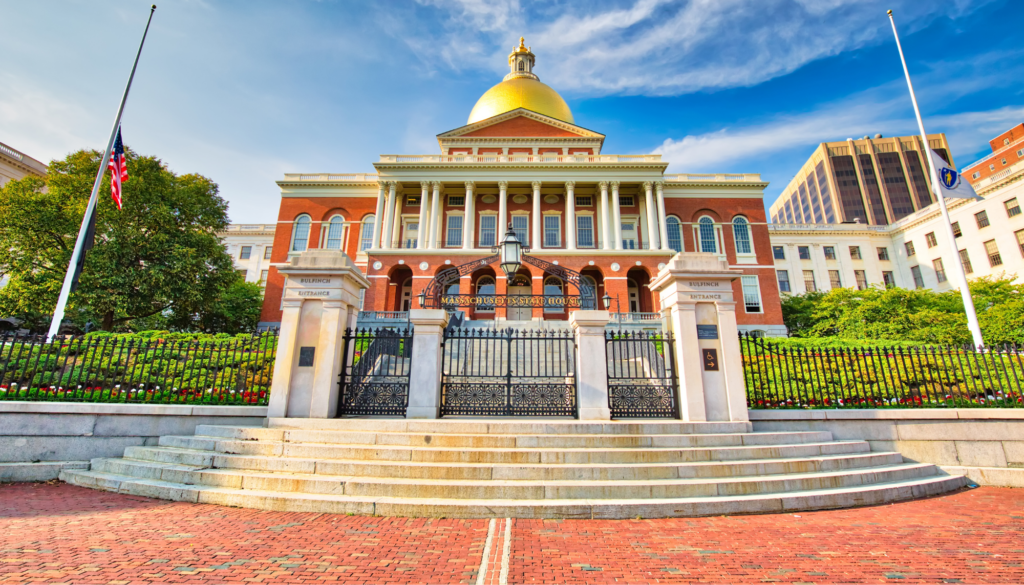What You Need to Know about Massachusetts’s Tax Refund Program

If you live in Massachusetts, you’ve probably heard the good news: starting November 1, an estimated 3 million Massachusetts taxpayers will receive a refund equal to a little more than 14% of their 2021 Massachusetts income tax liability.
Refund recipients can thank Chapter 62F, a Massachusetts state law that requires the government to issue a credit to taxpayers in the event of a budget surplus. In this post, we’ll explain what Chapter 62F, why there’s a surplus, and how to make sure you get your refund if you’re eligible for one.
What Is Chapter 62F?
Chapter 62F was enacted by voters back in 1986 and triggered for the first—and until now, only—time in 1987. It requires the state’s Department of Revenue to issue a credit to taxpayers in the event of a budget surplus if total tax revenues in a fiscal year exceed an annual cap. In September, the State Auditor determined that the net state tax revenues for the fiscal year exceeded the allowable state tax revenues by $2.941 billion.
The credit is applied to the personal income tax liability proportionate to what taxpayers paid the year prior. Initial estimates put the credit amount at 13%, but that has since been revised to 14% (14.0312%, to be precise).
Why Does Massachusetts Have a Surplus?
The Commonwealth’s unprecedented surplus revenue can be credited to a number of possible factors. Luke Stein, a professor at Babson College, has suggested that it may be due in part to an increase in sales tax, thanks to pandemic spending and higher prices, income gain from the stock market, and a change in state law that affects how taxes from pass-through businesses are collected.
The Massachusetts Taxpayers Foundation says the surplus exists “because the original FY 2021 budget relied on close to $2 billion in one-time resources, including the Stabilization Fund. Much of last year’s excess tax revenue was used to eliminate the need for these temporary revenues. The original FY 2022 budget did not rely on the Stabilization Fund or other one-time resources, freeing up excess tax revenues for the surplus.”
Regardless of the exact reasons for the surplus, it’s unlikely that there will be another one in the near future.
Who is Eligible for a Refund?
Anyone who paid personal income tax in Massachusetts for the 2021 tax year and files a return on or before September 15, 2023, is eligible to receive a refund. This includes resident and non-resident filers, fiduciary filers (trusts and estates), and non-residents on whose behalf a partnership or S corporation files on a composite basis are eligible
Note that credits may be reduced due to refund intercepts, such as unpaid tax liability or unpaid child support.
Criticism of Chapter 62F
Virtually no one will complain about getting a credit on their taxes, but it’s worth noting that 64F isn’t without its detractors.
The Massachusetts Budget & Policy Center has criticized the credit, saying that the state government lowered tax estimates in 2020 in the face COVID and an expected economic slowdown. However, thanks to federal relief legislation, the actual revenues collected were far higher than the originally estimated $27.0 billion coming in at $34.2 billion. In other words, the “surplus” isn’t a true surplus; rather, it’s a result of underestimating actual revenue.
Other critics have pointed out that 62F disproportionately benefits high-income earners. State personal income taxes represent only about 35% of all Massachusetts’s state and local tax revenue, but taxpayers with no personal income tax liability will not receive credit, despite paying sales and other taxes.
What Do You Need to Do to Get Your Refund?
You probably won’t have to do anything. Taxpayers who have already filed their 2021 tax return and had a tax liability will automatically receive their refund by December 15. Eligible taxpayers who haven’t yet filed their 2021 returns but do so by September 15, 2023, will receive a refund about a month after filing. Refunds will be issued via direct deposit or mailed as a check.
Learn More
You can learn more about Chapter 62F taxpayer refunds and estimate the amount of your refund at www.mass.gov/62Frefunds. Taxpayers with questions about their refund can call 877-677-9727, Monday through Friday, 9 am–4 pm.
If you need help filing a Massachusetts tax return for 2021 (or any year), be sure to contact our office.
Let's Talk
If you’re interested in working with Tonneson + Co, please reach out to us. We look forward to hearing from you!
